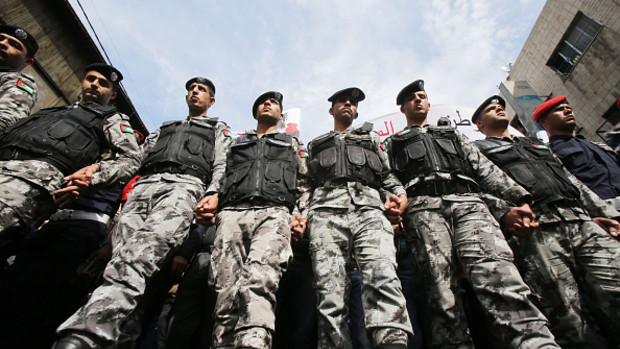Jordan’s King Abdullah II was in battle gear last week, quoting Clint Eastwood and bombing Islamic State targets in retaliation for the horrific burning-alive of a Jordanian pilot. Is this a sign that Jordan is entering the war against the insurgent group in earnest, or is it a temporary show for a stunned Jordanian public?
The complicated reality is that Jordan and Islamic State are enmeshed in an extended, dynamic, repeat-play game in which the rules are just now being set. In fact, Abdullah was signaling to Islamic State that if it engages in further public challenges to the Hashemite Kingdom, he’s prepared to devote real resources to the war against the militants.
For its part, Islamic State was testing Abdullah by publicizing the video, trying to figure out how vulnerable Jordan’s ever-cautious monarchy is, or thinks it is, to being undermined by an external threat that could easily become internal. The lesson of last week’s exchange of messages between Jordan and Islamic State is that the struggle between them may just be getting started.
To see how that struggle is likely to evolve, begin with Islamic State’s strategic interests vis-à-vis Jordan. The shape-shifting entity now has forces within or near the borders of three weak states, one strong state and Jordan. The two weakest states are Syria and Iraq, from which Islamic State has carved out great swaths of territory. The third weak state is Lebanon, where Islamic State could potentially find adherents among radical Sunnis, at the cost of finding itself in a pitched battle with Lebanese Hezbollah and Christian militias. So far, the group has held back from confrontation there. The strong state is Turkey, which Islamic State has no realistic chance of confronting successfully; instead it has taken advantage of Turkey’s ambivalence about a spreading Kurdish state to fight Kurdish forces in the shadow of the Turkish border, as at Kobani.
Then there’s Jordan. The state is much stronger than its Levantine neighbors, benefiting from a religiously heterogeneous Sunni Arab population. Its internal fault line has traditionally been between Jordanians of Palestinian origin, who by some accounts make up two-thirds of its population, and ur-Jordanians of tribal origin and (sometimes) continuing affiliation. To simplify a complex history, the Hashemite monarchy has owed its continued existence to a skillful and permanent juggling act between these constituencies. The tribes demand patronage and offer loyalty; the Palestinians offer entrepreneurship and seek influence in return.
Without a reliable source of revenue such as petroleum to buy off its population, Jordan has been, and remains, vulnerable to fundamentalist challenges. Remember Abu Musab al-Zarqawi, the feared leader of Al-Qaeda in Mesopotamia, one of Islamic State’s predecessor organizations? He was from Zarqa, a Jordanian town 15 miles northeast of Amman. This city of 700,000 produced not only Zarqawi, who took the town’s name as his nom de guerre, but also a number of other radical jihadis.
To Islamic State, then, Jordan offers a potential target of opportunity. The group wouldn’t challenge Jordanian sovereignty directly — for now. But over the medium to long term, it could plausibly strive to delegitimize the monarchy from without and within. It could do so with the mixed strategy of showing the regime’s weakness by killing Jordanians and promoting acts of terrorism within the kingdom. Even if efforts to weaken Abdullah failed, Islamic State would still be on the offensive against Jordan, which would be better than the defensive. Jordan is the most likely base from which to stage the efforts of any serious coalition to take on the insurgents.
From Jordan’s perspective, Islamic State is unquestionably bad news. The radical destabilization of neighboring Syria and Iraq is perhaps worse for Jordan than any other country. As happened during the birth of the Iraqi refugee crisis, early refugees from Syria came to Jordan with money — but they stayed after their money ran out, and were followed by penniless refugees whose presence further destabilizes Jordan. Some international financial aid has eased the burden, but a country whose population consists in no small part of Palestinian refugees will never take its eye off the refugee problem.
And Abdullah understands perfectly well that he represents a target of opportunity to Islamic State. That explains the aggressiveness of his public response to the pilot’s gruesome death. Abdullah is trying to communicate to Islamic State leadership that there’s no percentage in humiliating him by killing his airmen. Islamic State does not yet pose an existential threat to Abdullah — but if it chose to focus on his regime, it could.
So long as the militants get the message and back down, Abdullah’s interest lies in helping anti-Islamic State efforts without committing himself irrevocably to them and hurting his standing with Sunni Jordanians who may feel sympathy with their Syrian and Iraqi counterparts. Abdullah could have played it cool, hoping that anti-insurgent sentiment would eventually burn out any nascent support. But this would be an extremely risky strategy given the inherent vulnerability of the monarchy to delegitimation. Holding back could easily be construed as weakness, not wisdom.
But escalation, even rhetorical escalation, has its own risks. Islamic State may well escalate in return — which would require Jordan to commit more serious and long-term resources against it, possibly including ground troops. This would thrill the U.S. and probably please Saudi Arabia, because both have a desire to fight Islamic State without using their ground troops. Islamic State, of course, knows all this, too — but it might welcome the chance for a limited ground war against Jordanian forces, calculating that survival would turn the group into a permanent, credible regional actor.
This isn’t the beginning of the end or even the end of the beginning. As far as Jordan and Islamic State are concerned, it’s the beginning of the beginning.
http://www.bloombergview.com/articles/2015-02-09/why-jordan-is-islamic-state-s-next-target









